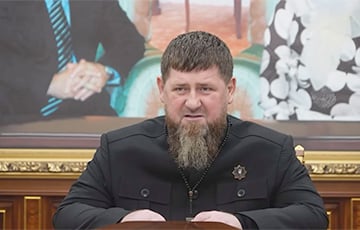Kadyrov's Associates Indulge In Looting
- 21.05.2024, 13:00
- 8,184

Details from the Kherson region of Ukraine have become known.
Russians are registering companies for growing and trading grains in the occupied territories of the Kherson region of Ukraine. Alesya Marokhovskaya, editor of the data department of the publication “Important Stories,” spoke about this on the FREEDOM TV channel.
According to the publication, since February 2022, 892 agricultural companies have been registered in the Russian-occupied territories of Ukraine. More than half of them were opened by entrepreneurs from Russian regions, the rest by local residents. Among such companies is Agro 24, registered in February of this year in the village of Askania-Nova in the Kherson region. According to Important Stories journalists, the company is owned by 43-year-old Elbek Zaiyev from Chechnya, whose brother is one of the security officials close to the head of Chechnya, Ramzan Kadyrov.
“Our material is dedicated to the Kherson region, which, before the full-scale invasion and occupation of the region, was one of the three leaders in terms of grain harvest volumes. Of course, this is important and interesting for people who occupied the territory and who are now receiving assets there, because this is a great way to make money here too, just come to everything ready, pick it up and start selling. A very profitable business,” said Marokhovskaya.
According to her, it is too early to talk about the profits and turnover of such Russian companies in the occupied territories, since they have not yet published any financial statements that would be publicly available.
“However, there are details that we see. For example, another company, also associated with a Chechen entrepreneur, sold barley to a Rostov company. The Rostov company is already selling this to everyone. And we found that it's about 4.5 million over the entire period, but that's a very small period of time. That is, it is important to stipulate here that we cannot yet speak with certainty about any amounts and scale of marauder earnings from the occupied territories. Because we see a very small part. We saw that this company had sales of 4.5 million rubles of barley and supplies to a Rostov company. And this Rostov company was not at all satisfied with this cooperation with Chechen businessmen, because we discovered that they filed a lawsuit in the Rostov court, because the Chechen company in Kherson received the money, but did not deliver barley for about 900 thousand rubles,” said Marokhovskaya.
She noted that a journalist from “Important Stories” contacted an employee of this company, who described what was happening in the occupied territory as “some are fighting, others are trading — and this is one clan.”
“And on the example of the Zaiyev brothers, this can be traced very well, because the full responsibility of one brother for sending troops to Ukraine, including participation in the occupation of these territories, can be traced. Suddenly his brother appears, who has never been engaged in any entrepreneurial activity before, and all at once for some reason he becomes a Kherson agrarian. And this is not the first symptom that such a, one might say, gangster division of resources is obviously happening in the occupied territories. Because Ramzan Kadyrov’s army took part in the occupation of territories, they really had a hand in many war crimes. And after that you can see how this family receives a conditional reward. So you got it, you did what Vladimir Putin wanted, you get your piece of the pie,” Marokhovskaya said.
She stated that people associated with head of Chechnya Ramzan Kadyrov previously, according to sources, had the opportunity to export metal from occupied Mariupol, and now they were given another important asset — grain in the Kherson region.
“Now we see that, in addition to metal, they receive another very, very important valuable asset — this is grain from the Kherson region. This is indeed a very valuable thing that is very profitable to sell and resell. Even more so, when you get it either for just zero money or at a very reduced cost,” said the editor of the data department of the “Important Stories” publication.










